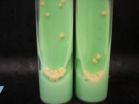(Press-News.org) WASHINGTON, Sept. 23, 2014 — Antibiotics revolutionized health care in the early 20th century, helping kill bacteria that once killed thousands of people. But bacteria are also constantly outsmarting science, and new strains of antibiotic-resistant bacteria are popping up more frequently. This week's Speaking of Chemistry focuses on the current shortage of new antibiotics and discusses the prospects for new drugs. The episode also answers the question: Why should you finish your pills if you feel better? Check it out at: http://youtu.be/MAoDuSxXIUQ.
Antibiotics are just one kind of medicine that chemistry makes possible. Want to learn about cutting-edge drug discovery? Attend a FREE conference — online — from C&EN. Watch live on September 24, or see archived talks during all of 2014. Sign up at http://cenm.ag/symposium
Speaking of Chemistry is a production of Chemical & Engineering News, a weekly magazine of the American Chemical Society. The program features fascinating, weird and otherwise interesting chemistry topics. Subscribe to the series at http://youtube.com/CENOnline and follow us on @CENmag.
INFORMATION:
The American Chemical Society is a nonprofit organization chartered by the U.S. Congress. With more than 161,000 members, ACS is the world's largest scientific society and a global leader in providing access to chemistry-related research through its multiple databases, peer-reviewed journals and scientific conferences. Its main offices are in Washington, D.C., and Columbus, Ohio.
To automatically receive news releases from the American Chemical Society, contact newsroom@acs.org.
Follow us: Twitter Facebook
Speaking of Chemistry: Why we need antibiotics (video)
2014-09-23
ELSE PRESS RELEASES FROM THIS DATE:
Brain wave may be used to detect what people have seen, recognize
2014-09-23
Brain activity can be used to tell whether someone recognizes details they encountered in normal, daily life, which may have implications for criminal investigations and use in courtrooms, new research shows.
The findings, published in Psychological Science, a journal of the Association for Psychological Science, suggest that a particular brain wave, known as P300, could serve as a marker that identifies places, objects, or other details that a person has seen and recognizes from everyday life.
Research using EEG recordings of brain activity has shown that the P300 ...
Researchers develop new DNA sequencing method to diagnose tuberculosis
2014-09-23
Researchers working in the UK and The Gambia, have developed a new approach to the diagnosis of tuberculosis (TB) that relies on direct sequencing of DNA extracted from sputum (a technique called metagenomics) to detect and characterize the bacteria that cause TB without the need for time-consuming culture of bacteria in the laboratory.
The research, reported today in the peer-reviewed journal PeerJ, was directed by Professor Mark Pallen, Professor of Microbial Genomics at Warwick Medical School and Dr Martin Antonio, head of the TB diagnostics laboratory at UK Medical ...
Chimpanzees raised as pets or performers suffer long-term effects on their behavior
2014-09-23
Although the immediate welfare consequences of removing infant chimpanzees from their mothers are well documented, little is known about the long-term impacts of this type of early life experience. In a year-long study, scientists from Lincoln Park Zoon observed 60 chimpanzees and concluded that those who were removed from their mothers early in life and raised by humans as pets or performers are likely to show behavioral and social deficiencies as adults.
The multi-institutional research project, published today in the open-access journal PeerJ, was led by Steve Ross, ...
Does the belief in guardian angels make people more cautious?
2014-09-23
Los Angeles, CA (September 23, 2014) While many believe that guardian angels watch over to keep them safe in a dangerous world, a new study finds that those who believe are actually less inclined to take risks despite this believed protection. This study was published today in the open access journal SAGE Open.
Researchers David Etkin, Jelena Ivanova, Susan MacGregor, and Alalia Spektor surveyed 198 individuals and found that of those who believe in guardian angels, 68% said that this belief affects how they take risks.
While some expressed that the belief in guardian ...
A multi-function protein is key to stopping genomic parasites from 'jumping'
2014-09-23
Most organisms, including humans, have parasitic DNA fragments called "jumping genes" that insert themselves into DNA molecules, disrupting genetic instructions in the process. And that phenomenon can result in age-related diseases such as cancer. But researchers at the University of Rochester now report that the "jumping genes" in mice become active as the mice age when a multi-function protein stops keeping them in check in order to take on another role.
In a study published today in Nature Communications, Professor of Biology Vera Gorbunova and Assistant Professor ...
Aberrant PI3K/AKT/mTOR pathway found in vestibular schwanommas may be therapeutic target
2014-09-23
Charlottesville, VA (September 23, 2014). Researchers from the University of Toronto, directed by Drs. Gelareh Zadeh and Boris Krischek, investigated gene expression in normal vestibular nerves and vestibular schwannomas (VSs). Two important discoveries were made: 1) there is negligible difference between VSs that sporadically occur and those commonly associated with neurofibromatosis Type 2 (NF2), a genetic disorder; and 2) the overexpressed PI3K/AKT/mTOR signaling pathway in these tumors may be an excellent therapeutic target. Detailed findings of this study are reported ...
Presence or absence of early language delay alters anatomy of the brain in autism
2014-09-23
A new study led by researchers from the University of Cambridge has found that a common characteristic of autism – language delay in early childhood – leaves a 'signature' in the brain. The results are published today (23 September) in the journal Cerebral Cortex.
The researchers studied 80 adult men with autism: 38 who had delayed language onset and 42 who did not. They found that language delay was associated with differences in brain volume in a number of key regions, including the temporal lobe, insula, ventral basal ganglia, which were all smaller in those with ...
Critically ill ICU patients lose almost all of their gut microbesand the ones left aren't good
2014-09-23
Researchers at the University of Chicago have shown that after a long stay in the Intensive Care Unit (ICU) only a handful of pathogenic microbe species remain behind in patients' intestines. The team tested these remaining pathogens and discovered that some can become deadly when provoked by conditions that mimic the body's stress response to illness.
The findings, published in mBio®, the online open-access journal of the American Society for Microbiology, may lead to better monitoring and treatment of ICU patients who can develop a life-threatening systemic infection ...
Federal food program puts food on the table, but dietary quality could be improved
2014-09-23
ATLANTA – September 23, 2014 –A new American Cancer Society study suggests that participants in the Supplemental Nutrition Assistance Program (SNAP), previously known as the food stamp program, had lower dietary quality scores compared with income eligible non-participants. The authors say the findings emphasize the need to bolster programs aimed at enhancing the dietary quality of SNAP participants.
The SNAP program aims to assist low-income individuals and households with the resources to obtain a nutritionally adequate diet. In 2013, approximately 47.6 million individuals, ...
Statin use during hospitalization for hemorrhagic stroke associated with improved survival
2014-09-22
OAKLAND, Calif., September 22, 2014 –Patients who were treated with a statin in the hospital after suffering from a hemorrhagic stroke were significantly more likely to survive than those who were not, according to a study published today in JAMA Neurology. This study was conducted by the same researchers who recently discovered that the use of cholesterol-lowering statins can improve survival in victims of ischemic stroke.
Ischemic stroke is caused by a constriction or obstruction of a blood vessel that blocks blood from reaching areas of the brain, while hemorrhagic ...

